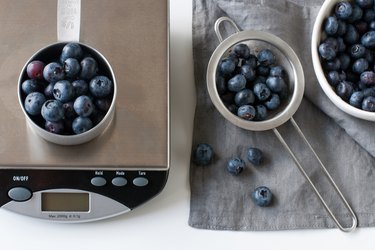
Blueberries are one of the healthiest foods you can eat, chock full of vitamins and antioxidants. They're also low in calories, which means you can grab a handful of blueberries whenever hunger strikes. However, eating too much of any food isn't healthy, so berry munch in moderation.
Tip
One serving of blueberries is one cup.
Video of the Day
A Cup of Blueberries
Don't let their small size deceive you — blueberries pack a lot of nutrition. A one-cup serving of the berries provides just 84 calories, according to the USDA, but for those calories, you get vital macro and micronutrients.
Video of the Day
Blueberries are an especially rich source of dietary fiber, with 3.5 grams per cup. Fiber is crucial for digestive health, helping to normalize bowel movements and prevent digestive diseases, including diverticular disease and hemorrhoids. According to the Mayo Clinic, getting enough fiber likely reduces the risk of colon cancer.
Fiber can also help lower cholesterol and, potentially, blood pressure and inflammation, all of which can reduce your risk of heart disease. Additionally, eating plenty of fiber-rich foods can help you manage your weight because they tend to be more satiating and filling than low-fiber foods. The fiber in a cup of blueberries makes up 14 percent of the 25 grams women need each day and just under 10 percent of the 38 grams men need, per the recommendations of the National Academies of Medicine.
Blueberries are also a good source of vitamin C, a nutrient that supports a healthy immune system and plays a crucial role in the formation of collagen and wound healing. There are 14 milligrams in a serving size of blueberries, which is 19 percent of the recommended daily intake for women and 16 percent of the recommended daily amount for men.
You'll also get a significant portion of your daily vitamin K needs. Vitamin K acts as a coenzyme, required for the production of proteins that aid blood clotting, bone metabolism and many other functions. With 29 micrograms per cup, a serving provides 32 percent of the recommended daily intake for women and 24 percent of a man's daily needs.
Read more: 19 High-Fiber Foods — Some May Surprise You!
Blueberries in Disease Prevention
Blueberries get their "superfood" status in large part due to their high content of powerful plant chemicals called antioxidants. These bioactive compounds aren't considered essential, as are vitamins and minerals; however, they play an important role in human health.
According to an article published in the International Journal of Molecular Sciences in September 2018, blueberries contain flavonoids, polyphenols, phenolic acids, pyruvic acid and chlorogenic acid, all of which have been shown to have anti-inflammatory, anti-cancer and anti-obesity effects. In addition, they play a role in preventing heart disease and diabetes, protecting the lungs, vision and liver, enhancing immunity, improving brain function, and slowing cognitive decline.
Most fruits and vegetables are good sources of antioxidants. Health.gov recommends adults eat two to four servings of fruit and three to five servings of vegetables each day, depending on age, sex and activity level. Eat blueberries in addition to other antioxidant-rich foods, such as raspberries, pomegranates, sweet potatoes, walnuts, pecans and kale.
Choose the freshest blueberries by looking for those that are firm, plump and dry with a dusty blue color, says the USDA. Add fresh blueberries to oatmeal or smoothies, stir them into yogurt or sprinkle them on a fresh green salad. Frozen blueberries are a good choice when fresh are not in season. Frozen blueberries work best in smoothies, homemade sorbet and whole-grain baked goods. You can also eat them as is for a cool treat on a warm day.
Read more: Top 10 Healthiest Fruits & Vegetables
- NIH: "Food Exchange Lists"
- USDA: "Blueberries, Raw"
- Mayo Clinic: "Dietary Fiber: Essential for a Healthy Diet"
- National Academies of Medicine: "Dietary Reference Intakes (DRIs): Recommended Dietary Allowances and Adequate Intakes, Total Water and Macronutrients"
- NIH: "Vitamin C"
- National Academies of Medicine: "Dietary Reference Intakes (DRIs): Recommended Dietary Allowances and Adequate Intakes, Vitamins "
- NIH: "Vitamin K"
- Path to the Plate: "5 Things to Know about Blueberries"
- International Journal of Molecular Sciences: "Molecular Mechanism and Health Role of Functional Ingredients in Blueberry for Chronic Disease in Human Beings"
- Health.gov: "Build a Healthy Base"
- Mayo Clinic: "Slide Show: Add Antioxidants to Your Diet"
- USDA: "Blueberries and Health"